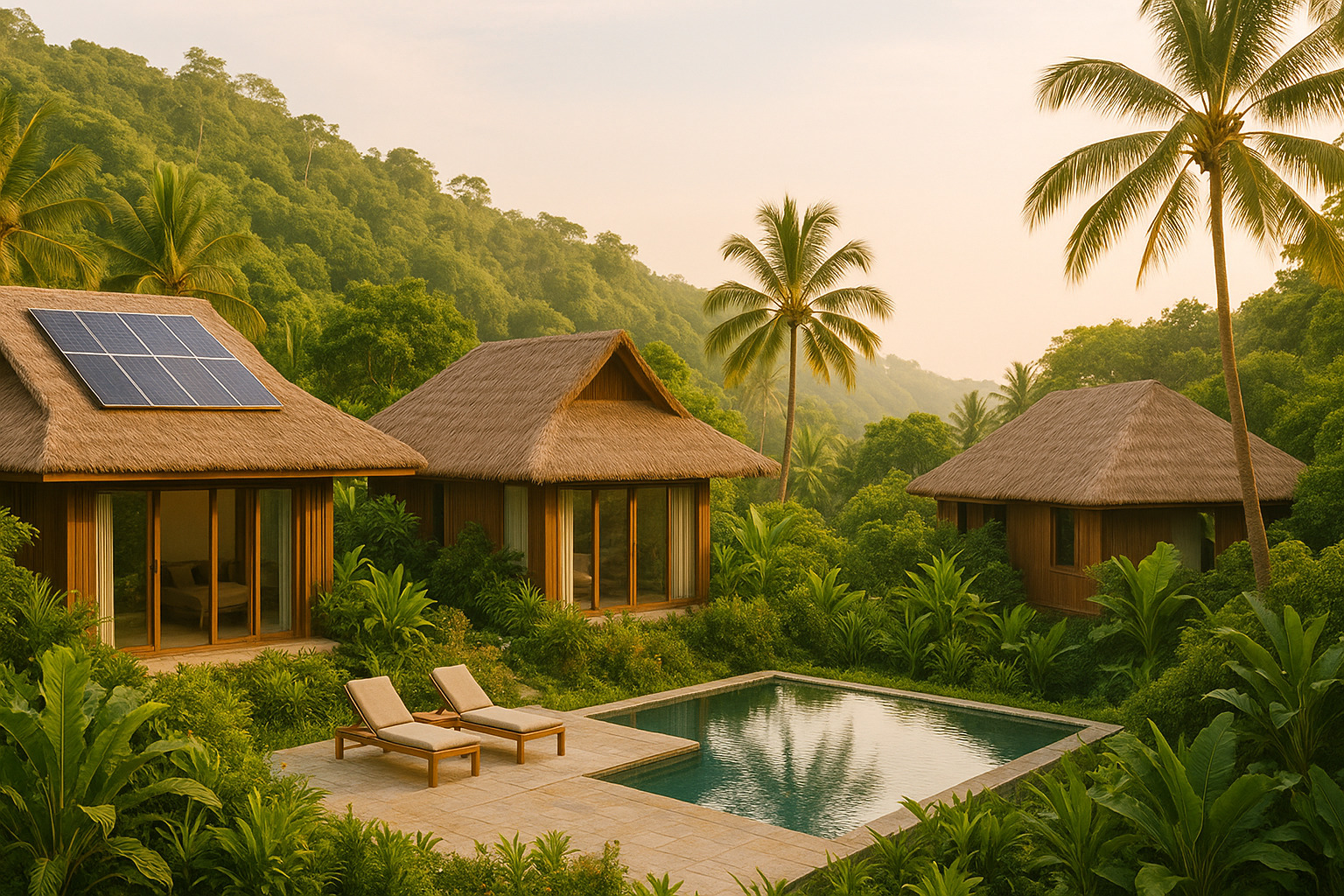
Sustainable Luxury Travel: How to Explore Responsibly Without Compromising Comfort
Discover how to travel sustainably while maintaining luxury standards. Learn about eco-friendly resorts, carbon offsets, and responsible tourism practices.

Sustainable Luxury Travel Principles:
- • Choose accommodations with verified sustainability certifications
- • Support local communities and economies
- • Minimize environmental impact while maximizing comfort
- • Invest in experiences that create positive change
The days when luxury travel meant ignoring environmental and social impact are over. Today's sophisticated travelers understand that the most rewarding journeys are those that leave destinations better than they found them—without sacrificing the comfort, service, and extraordinary experiences they've come to expect.
As a luxury travel advisor, I've witnessed a remarkable transformation in the industry. The world's finest hotels, resorts, and tour operators now lead sustainability initiatives not as marketing tactics, but as core values. This shift has created unprecedented opportunities for conscious luxury travelers to explore the world responsibly while enjoying uncompromising quality.
The New Definition of Luxury Travel
Modern luxury travel isn't just about thread counts and champagne service—though those remain important. It's about meaningful experiences that connect you authentically with destinations while contributing positively to local communities and environments.
What Sustainable Luxury Looks Like
Environmental Stewardship
- Carbon-neutral or negative operations
- Renewable energy and water conservation
- Zero-waste or circular economy practices
- Protection of local ecosystems and wildlife
- Sustainable transportation options
Social Responsibility
- Fair wages and local employment
- Support for community projects
- Preservation of cultural heritage
- Educational and empowerment programs
- Authentic cultural exchange opportunities
Leading Sustainable Luxury Destinations
Costa Rica: Pioneering Eco-Luxury
Costa Rica has set the global standard for sustainable tourism, with luxury resorts that are completely carbon neutral and actively contribute to reforestation and wildlife protection. Here, you can stay in world-class accommodations while directly supporting conservation efforts.
Costa Rica's Sustainability Leadership:
- 98% renewable energy across the entire country
- 30% of land designated as protected areas
- Certification for Sustainable Tourism (CST) program
- Blue Flag ecological certification for beaches
- Payment for Ecosystem Services (PES) program
Rwanda: Conservation Through Luxury Tourism
Rwanda's high-value, low-impact tourism model demonstrates how luxury travel can directly fund conservation. Gorilla trekking permits and luxury lodge stays contribute millions annually to gorilla protection and community development.
New Zealand: Clean & Green Luxury
New Zealand's luxury accommodations excel at showcasing the country's pristine natural beauty while protecting it. From carbon-neutral wineries to eco-lodges powered entirely by renewable energy, luxury and sustainability are seamlessly integrated.
Bhutan: Gross National Happiness Model
Bhutan's "high value, low impact" tourism policy limits visitor numbers while ensuring those who visit enjoy exceptional experiences. The country's carbon-negative status and focus on well-being over GDP creates a unique luxury travel paradigm.
How to Choose Sustainable Luxury Accommodations
Not all properties claiming sustainability deliver on their promises. Here's how to identify truly sustainable luxury accommodations that meet both your comfort expectations and values.
Key Certifications to Look For
Gold Standard Certifications
LEED (Leadership in Energy & Environmental Design): Comprehensive building sustainability standards
Green Globe: Global sustainability certification for travel and tourism
EarthCheck: Scientific benchmarking for sustainable travel and tourism
Rainforest Alliance: Focus on environmental and social sustainability
B Corp Certification: Meets highest standards of social and environmental performance
Questions to Ask Before Booking
- Energy: What percentage of energy comes from renewable sources?
- Water: What water conservation and treatment systems are in place?
- Waste: How is waste minimized, reused, and recycled?
- Local Impact: How does the property support the local community?
- Conservation: What environmental protection programs do you support?
- Culture: How do you preserve and share local cultural heritage?
Sustainable Transportation in Luxury Travel
Transportation typically accounts for the largest portion of travel-related carbon emissions. Sustainable luxury travel requires thoughtful transportation choices that balance environmental impact with comfort and convenience.
Flight Strategies for Conscious Travelers
Minimize Flight Impact
- Choose direct flights when possible
- Fly with airlines committed to sustainability
- Select newer, more fuel-efficient aircraft
- Consider premium economy over business for shorter flights
- Extend trips to justify long-haul flights
Carbon Offset Excellence
- Choose Gold Standard or VCS certified offsets
- Invest in additional offsets beyond calculations
- Select projects with measurable co-benefits
- Support local offset projects when possible
- Consider carbon-negative options
Ground Transportation Alternatives
Luxury doesn't require sacrificing sustainability. Many destinations now offer premium, eco-friendly transportation options that enhance rather than diminish the travel experience.
- Luxury Train Travel: Orient Express, Royal Scotsman, and other premium rail experiences
- Electric Vehicle Transfers: Tesla and other premium EV fleets for ground transport
- Hybrid Yacht Charters: Solar and wind-powered luxury sailing experiences
- Cycling Tours: E-bike luxury tours with gourmet picnics and support vehicles
- Walking Experiences: Luxury hiking with porter services and glamping
Responsible Luxury Experiences
The most meaningful luxury experiences are those that create authentic connections with destinations and contribute positively to local communities. These experiences often prove more memorable than traditional luxury activities.
Cultural Immersion with Purpose
Examples of Purposeful Luxury Experiences:
- Private cooking classes with local families, including market tours and meal sharing
- Artisan workshops where you learn traditional crafts while supporting local artisans
- Conservation experiences like sea turtle protection or reforestation projects
- Educational tours with local historians and cultural experts
- Community-based tourism where accommodations and experiences directly benefit residents
Wildlife and Nature Experiences
Luxury wildlife experiences should prioritize animal welfare and habitat protection over entertainment value. The best operators contribute significantly to conservation while providing extraordinary encounters.
The Economics of Sustainable Luxury Travel
Sustainable luxury travel often costs more upfront but delivers greater value through meaningful experiences, positive impact, and often higher service quality. Understanding this value proposition helps justify the investment.
Why Sustainable Luxury Costs More
- Renewable Energy Infrastructure: Initial investment in solar, wind, and other clean energy systems
- Fair Wages: Living wages for staff and suppliers, often above local market rates
- Local Sourcing: Higher costs for locally-sourced, organic, and artisanal products
- Conservation Contributions: Direct funding for environmental and cultural protection
- Smaller Scale: Lower guest numbers mean higher per-person operational costs
- Certification and Monitoring: Ongoing costs for sustainability verification and improvement
The Return on Investment
While sustainable luxury travel may cost 20-40% more than conventional luxury options, travelers consistently report higher satisfaction, more meaningful experiences, and greater sense of purpose from their journeys.
Planning Your Sustainable Luxury Journey
Creating a truly sustainable luxury itinerary requires careful consideration of every element—from transportation and accommodations to activities and dining. Here's how to approach the planning process.
Anna's Sustainable Luxury Planning Framework
Phase 1: Destination Selection
- Research destinations with strong sustainability initiatives
- Consider climate change impacts and seasonal variations
- Evaluate political stability and ethical considerations
- Assess transportation options and carbon footprint
Phase 2: Impact Assessment
- Calculate total carbon footprint of proposed itinerary
- Identify opportunities for positive community impact
- Research conservation projects you can support
- Plan cultural experiences that benefit local communities
Phase 3: Optimization
- Extend stays to justify transportation emissions
- Choose accommodations with highest sustainability ratings
- Select experiences that align with your values
- Plan for meaningful connections with local people
Measuring Your Travel Impact
True sustainable luxury travel requires ongoing measurement and improvement of your travel impact. The goal isn't perfection—it's progress and conscious decision-making.
Tools for Impact Tracking
Carbon Footprint
- Use certified carbon calculators
- Track emissions by trip component
- Monitor year-over-year improvements
- Invest in high-quality offset projects
- Aim for carbon negative travel
Positive Impact
- Document community contributions
- Track conservation project support
- Measure cultural preservation activities
- Calculate local economic impact
- Monitor long-term destination health
The Future of Sustainable Luxury Travel
The sustainable luxury travel sector is evolving rapidly, with new technologies, certifications, and business models emerging regularly. Staying informed about these developments helps you make increasingly better choices.
Emerging Trends to Watch
- Regenerative Tourism: Travel that leaves destinations better than before
- Net-Positive Impact: Accommodations and experiences that create more benefit than impact
- Biophilic Design: Luxury properties integrated seamlessly with natural environments
- Circular Economy: Zero-waste operations with closed-loop resource systems
- Community Ownership: Luxury properties owned and operated by local communities
- Technology Integration: AI and IoT for optimized resource usage and minimal waste
Ready to Travel Sustainably in Style?
As a luxury travel advisor with deep expertise in sustainable tourism, I can help you create extraordinary journeys that align with your values without compromising on comfort or quality. Let's design a travel experience that leaves you fulfilled and the world a little better.
Remember: The most luxurious travel experiences are those that create lasting positive impact while providing exceptional comfort and authentic connection.

Anna Huttner
Sustainable luxury travel specialist and certified eco-tourism advisor. Anna works exclusively with accommodations and experiences that meet rigorous environmental and social standards while delivering exceptional luxury experiences.
